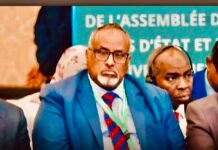By HAN News Desk
BOSASO – The Commander of Puntland’s elite DANAB Commando Forces, General Jimale Jama Takar, has carried out an extensive inspection tour of multiple DANAB military bases across Puntland, in a move aimed at assessing the operational strength, discipline, and readiness of his forces amid growing security challenges in the region.
The multi-day tour took General Takar to several strategic military locations in Bossaso, Garowe, and rural areas of Bari and Nugaal regions, where the elite forces are stationed. The commander’s visit comes at a crucial time as Puntland continues to strengthen its security institutions and respond to threats posed by militant groups and organized criminal networks.
During the visit, General Takar held closed-door meetings with senior DANAB officers, field commanders, and junior soldiers, listening to detailed briefings on their operational activities, recent achievements, and the challenges facing troops in the field. Discussions reportedly focused on logistical gaps, troop welfare, training needs, and the coordination between security agencies.
“Our purpose is to ensure that every soldier is well-equipped, well-trained, and motivated to defend the peace and stability of our people,” General Takar said during his inspection. “DANAB is the shield of Puntland — we must always be ready and united against any threat.”
General Takar praised the troops for their courage, sacrifice, and professionalism, noting that the DANAB Commandos have consistently proven to be one of the most effective counterterrorism forces in Somalia. He urged them to maintain high standards of discipline and integrity, emphasizing that the fight against extremism requires both physical strength and moral commitment.
“You are not only soldiers; you are protectors of your people’s hopes,” he added. “Your duty is sacred — defend your land, respect your uniform, and remain loyal to your mission.”
The commander was briefed on recent security operations targeting extremist hideouts in rural parts of Puntland, as well as joint patrols conducted with other security units to improve territorial control. Field reports indicated that DANAB forces have played a key role in preventing insurgent movements and securing vital routes used for trade and humanitarian aid delivery.
Military officials accompanying the commander noted that the inspection is part of a broader strategic reform initiative within Puntland’s security sector. The plan seeks to upgrade military infrastructure, improve logistics and equipment, and strengthen inter-agency coordination, particularly between the DANAB Commandos, Puntland Police, and Intelligence Services.
Observers say the visit also reflects Puntland’s commitment to professionalizing its armed forces in line with international standards. With support from international partners, DANAB has received advanced training in urban warfare, counterterrorism, intelligence gathering, and human rights compliance during operations.
The DANAB Commando Force, established with technical and logistical assistance from foreign partners, remains one of Puntland’s most trusted and respected military units. Its operations have been central to stabilizing areas affected by al-Shabaab infiltration and cross-border insecurity.
General Takar’s inspection tour is expected to continue in the coming days, with planned stops in Eyl, Qardho, and Burtinle, where he will meet additional troops, assess infrastructure, and identify areas in need of reinforcement.
Officials close to the commander told the media that the findings from the inspection will be compiled into a comprehensive security report to be presented to Puntland’s leadership. The report will outline recommendations for improving troop welfare, logistics, and operational planning as Puntland prepares for upcoming security operations in vulnerable regions.
Military analysts note that this proactive leadership approach demonstrates Puntland’s determination to maintain internal stability and remain a model of effective regional governance and security management in Somalia’s evolving federal landscape.





